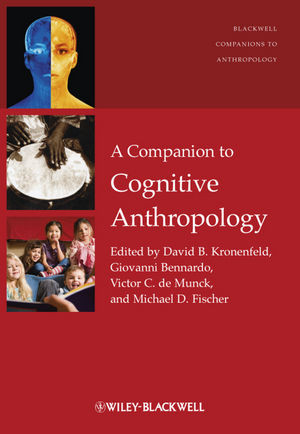A Companion To Cognitive Anthropology David B Kronenfeld by David B. Kronenfeld 9781405187787, 9781444394931, 1405187786, 1444394932 instant download after payment.
A
Companion to Cognitive Anthropology offers a comprehensive overview of the development of cognitive anthropology from its inception to the present day and presents recent findings in the areas of theory, methodology, and field research in twenty-nine key essays by leading scholars.
- Demonstrates the importance of cognitive anthropology as an early constituent of the cognitive sciences
- Examines how culturally shared and complex cognitive systems work, how they are structured, how they differ from one culture to another, how they are learned and passed on
- Explains how cultural (or collective) vs. individual knowledge distinguishes cognitive anthropology from cognitive psychology
- Examines recent theories and methods for studying cognition in real-world scenarios
- Contains twenty-nine key essays by leading names in the field
Content:
Chapter 1 A History of Cognitive Anthropology (pages 9–29): B. G. Blount
Chapter 2 The History of the Cultural Models School Reconsidered: A Paradigm Shift in Cognitive Anthropology (pages 30–46): Naomi Quinn
Chapter 3 The Cognitive Context of Cognitive Anthropology (pages 47–60): Jurg Wassmann, Christian Kluge and Dominik Albrecht
Chapter 4 The Limits of the Habitual: Shifting Paradigms for Language and Thought (pages 61–81): Janet Dixon Keller
Chapter 5 Types of Collective Representations: Cognition, Mental Architecture, and Cultural Knowledge (pages 82–101): Giovanni Bennardo and David B. Kronenfeld
Chapter 6 Personal Knowledge and Collective Representations (pages 102–114): John B. Gatewood
Chapter 7 How to Collect Data that Warrant Analysis (pages 115–130): W. Penn Handwerker
Chapter 8 Data, Method, and Interpretation in Cognitive Anthropology (pages 131–152): James Boster
Chapter 9 Multi?Item Scales and Cognitive Ethnography (pages 153–170): Kateryna Maltseva and Roy D'Andrade
Chapter 10 Consensus Analysis (pages 171–190): Stephen P. Borgatti and Daniel S. Halgin
Chapter 11 Narrative, Mind, and Culture (pages 191–209): Benjamin N. Colby
Chapter 12 Simulation (and Modeling) (pages 210–226): Michael Fischer and David B. Kronenfeld
Chapter 13 Mathematical Representation of Cultural Constructs (pages 227–253): Dwight Read
Chapter 14 Kinship Theory and Cognitive Theory in Anthropology (pages 254–269): F. K. L. Chit Hlaing
Chapter 15 Numerical Cognition and Ethnomathematics (pages 270–289): Andrea Bender and Sieghard Beller
Chapter 16 “Indigenous Knowledge” and the Understanding of Cultural Cognition: The Contribution of Studies of Environmental Knowledge Systems (pages 290–313): Roy Ellen
Chapter 17 Emotions, Motivation, and behavior in Cognitive Anthropology (pages 314–330): E. N. Anderson
Chapter 18 Social Networks, Cognition, and Culture (pages 331–354): Douglas R. White
Chapter 19 Culture and Cognition: The Role of Cognitive Anthropology in Anthropology and the Cognitive Sciences (pages 355–375): Norbert Ross and Douglas L. Medin
Chapter 20 Cultural Models, Power, and Hegemony (pages 376–392): Halvard Vike
Chapter 21 Cognitive Anthropology through a Gendered Lens (pages 393–412): Carol C. Mukhopadhyay
Chapter 22 Sociality in Cognitive and Sociocultural Anthropologies: The Relationships Aren't Just Additive (pages 413–429): Lynn Thomas
Chapter 23 Cognitive Anthropology and Education: Foundational Models of Self and Cultural Models of Teaching and Learning in Japan and the United States (pages 430–449): Hidetada Shimizu
Chapter 24 Archaeological Approaches to Cognitive Evolution (pages 450–467): Miriam Noel Haidle
Chapter 25 The Distributed Cognition Model of Mind (pages 469–488): Brian Hazlehurst
Chapter 26 A Foundational Cultural Model in Polynesia: Monarchy, Democracy, and the Architecture of the Mind (pages 489–512): Giovanni Bennardo
Chapter 27 Cognitive Approaches to the Study of Romantic Love: Semantic, Cross?Cultural, and as a Process (pages 513–530): Victor C. de Munck
Chapter 28 Trouble as Part of Everyday Life: Cognitive and Sociocultural Processes in Avoiding and Responding to Illness (pages 531–547): Linda C. Garro
Chapter 29 Using Consensus Analysis to Investigate Cultural Models of Alzheimer's Disease (pages 548–568): Robert W. Schrauf and Madelyn Iris


